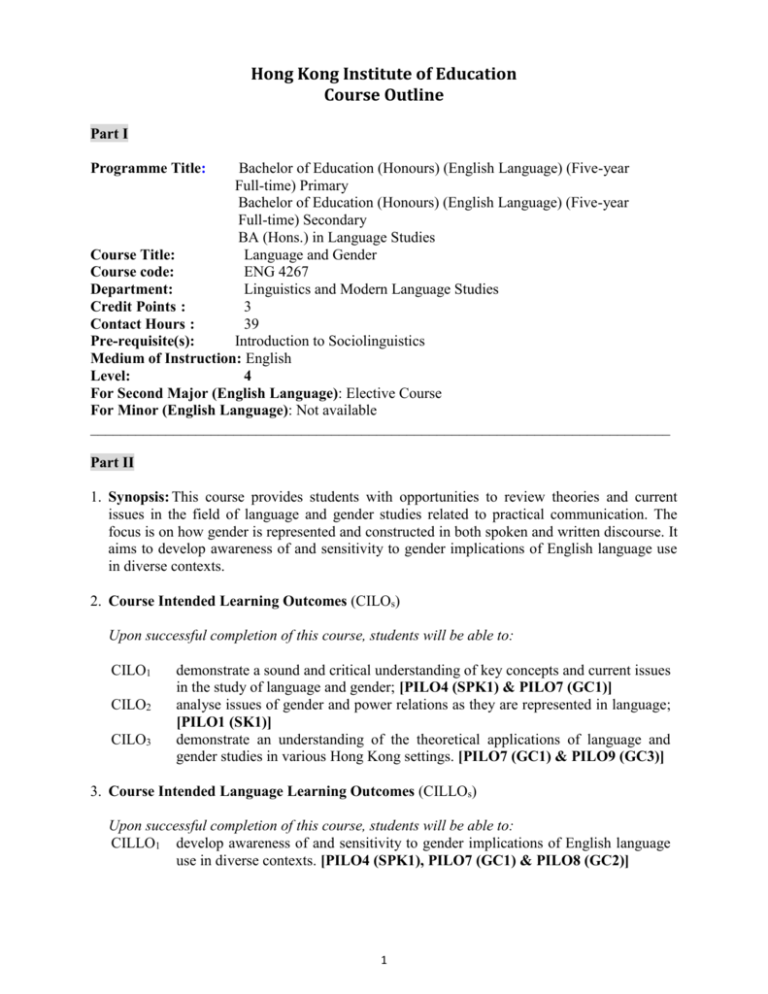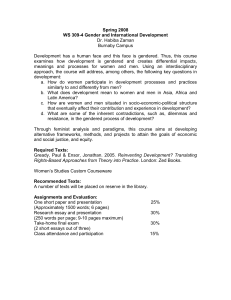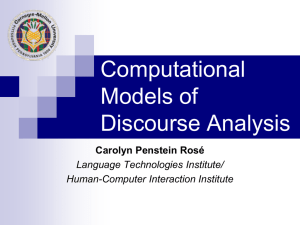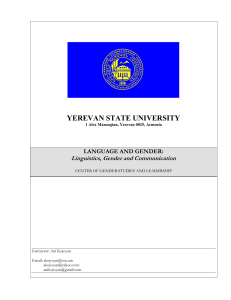Module Template - The Hong Kong Institute of Education
advertisement

Hong Kong Institute of Education Course Outline Part I Programme Title: Bachelor of Education (Honours) (English Language) (Five-year Full-time) Primary Bachelor of Education (Honours) (English Language) (Five-year Full-time) Secondary BA (Hons.) in Language Studies Course Title: Language and Gender Course code: ENG 4267 Department: Linguistics and Modern Language Studies Credit Points : 3 Contact Hours : 39 Pre-requisite(s): Introduction to Sociolinguistics Medium of Instruction: English Level: 4 For Second Major (English Language): Elective Course For Minor (English Language): Not available _____________________________________________________________________________ Part II 1. Synopsis: This course provides students with opportunities to review theories and current issues in the field of language and gender studies related to practical communication. The focus is on how gender is represented and constructed in both spoken and written discourse. It aims to develop awareness of and sensitivity to gender implications of English language use in diverse contexts. 2. Course Intended Learning Outcomes (CILOs) Upon successful completion of this course, students will be able to: CILO1 CILO2 CILO3 demonstrate a sound and critical understanding of key concepts and current issues in the study of language and gender; [PILO4 (SPK1) & PILO7 (GC1)] analyse issues of gender and power relations as they are represented in language; [PILO1 (SK1)] demonstrate an understanding of the theoretical applications of language and gender studies in various Hong Kong settings. [PILO7 (GC1) & PILO9 (GC3)] 3. Course Intended Language Learning Outcomes (CILLOs) Upon successful completion of this course, students will be able to: CILLO1 develop awareness of and sensitivity to gender implications of English language use in diverse contexts. [PILO4 (SPK1), PILO7 (GC1) & PILO8 (GC2)] 1 4. Content, CILOs and Teaching & Learning Activities Course Content CILOs/CILLOs Suggested Teaching & Learning Activities Introduction to language and gender CILO 1 , 2 studies: Overview of historical and theoretical development; Gender and sex; Dominance vs. difference; Feminist approaches to language; Diversity perspective Gendered spoken discourse: CILO 1, 2 , 3 ‘Verbal hygiene’ and political CILLO 1 correctness; Girl-talk/boy-talk in adolescent speech Women and men talking Readings, lectures, and class activities, and group presentations; assigned reading(s) will be indicated in the course schedule; students are expected to have completed the assigned reading(s) of the week before class. Gendered written discourse: Proverbs and quotations Gender identity and the mass media; Gender representation in Hong Kong popular culture; Gender representation in children’s and adolescent literature Gendered discourses in the language classroom: Gender representation in language textbooks; Construction of gender in the classroom; Gender and classroom interaction CILO 1, 2 , 3 CILLO 1 Readings, lectures, and class activities, and group presentations; assigned reading(s) will be indicated in the course schedule; students are expected to have completed the assigned reading(s) of the week before class. CILO 1, 2 , 3 CILLO 1 Readings, lectures, and class activities, and group presentations; assigned reading(s) will be indicated in the course schedule; students are expected to have completed the assigned reading(s) of the week before class. 2 Readings, lectures, and class activities, and group presentations; assigned reading(s) will be indicated in the course schedule; students are expected to have completed the assigned reading(s) of the week before class. 5. Assessment Assessment Tasks A critical gender analysis of texts (spoken or written) given by the lecturer(s) and conducted under examination conditions. A written essay (1,500 words) demonstrating a basic understanding of current issues in the field of language and gender studies. Students are required to collect authentic linguistic data (written or spoken), and employ basic sociolinguistic analytical methodologies. Weighting (%) 50 50 CILOs / CILLOs CILOs 1, 2 & 3 CILLO 1 CILOs 1, 2 & 3 CILLO 1 6. Required Text(s) Goddard, A. and Meân, L. (2008). Language and gender. New York: Routledge. 7. Recommended Readings Cameron, D. (Ed.) (1998). The feminist critique of language: A reader (2nd ed.). London: Routledge. Cameron, D. (2005). Language, gender, and sexuality: Current issues and new directions. Applied Linguistics, 26(4): 482-502. Coates, J. (2004). Women, men and language: A sociolinguistic account of gender differences in language. Harlow, UK: Longman. Eckert, P. and McConnell-Ginet, S. (2003). Language and gender. New York: Cambridge University Press. Lakoff, R.T. (2004). Language and woman's place: Text and commentaries. Oxford: Oxford University Press. Litosseliti, L. (2006). Gender and language: Theory and practice. London: Hodder Arnold. Mills, S. (1995). (Ed.) Language and gender: Interdisciplinary perspectives. London: Longman. Speer, S.A. (2005). Gender talk: Feminism, discourse and conversation analysis. London: Routledge. Sunderland, J. (2004). Gendered discourse. London: Palgrave. Sunderland, J. (2006). Language and gender: An advanced resource book. Abingdon: Routledge. Sunderland, J. et al., (1997). Gender in language textbooks: Looking beyond textual imbalance. Centre for Research in Language Education, Lancaster University. Sunderland, J. et al., (2000). From bias ‘in the text’ to ‘teacher talk around the text’: An exploration of teacher discourse and gendered foreign language textbook texts. Linguistics and Education, 11(3), 251-286. Talbot, M.M. (1998). Language and gender: An introduction. Cambridge: Polity. Tannen, D. (1991). You just don’t understand: Women and men in conversation. London: Virago. 3 8. Related Web Resources Equal Opportunities Commission Research Reports: http://www.eoc.org.hk/EOC/GraphicsFolder/InforCenter/Research/default.aspx Equal Opportunities Commission Conference Papers: http://www.eoc.org.hk/EOC/graphicsfolder/inforcenter/conference/content.aspx?type=8&date time=2009 9. Related Journals Gender and Education Gender and Society Journal of Gender Studies Sex Roles 4







